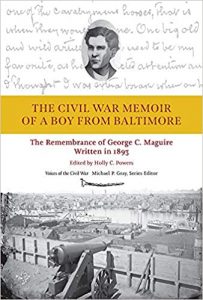Book Review: The Civil War Memoir of a Boy from Baltimore
 The Civil War Memoir of a Boy from Baltimore
The Civil War Memoir of a Boy from Baltimore
Edited by Holly I. Powers
University of Tennessee Press, 2021, $45.00 hardback
Reviewed by Bert Dunkerly
In 1861, 14- year-old George Maguire recorded his thoughts as tumultuous events unfolded in his hometown of Baltimore, Maryland. Aware of the tension and excitement in the air, but perhaps not the harsh realities of what was coming, he records insightful observations of events in Baltimore and then in the field with the Union army. The youngster followed his brother-in-law into the military as a volunteer. George did not formally enlist, but accompanied the 5th Maryland on several campaigns and did various odd jobs and administrative tasks.
Editor Holly I. Powers has produced a work that captures the growth of this young man through his early teenage years during the war. The story is very humanizing as George often reflects upon his experiences in his writings and admits to his own innocence and youthfulness many times. Written years later as an adult, the memoirs have the advantage of hindsight. As an example of the young man’s experiences, he laments about losing his knapsack full of souvenirs and personal items, “things I wished to preserve.” We can almost sense his sadness and resolve to collect things again and keep better track of them.
George discusses political rivalries in Baltimore in 1861, a very divided city. He shares local views on Lincoln and the tense early days of the conflict when troops were organized, and the city was occupied. This provides a good overview of the uncertainty that people faced in a border region, when no one knew what would happen next. No major battles were fought in or near Baltimore but taking the pulse of its citizens provides an important window into the home front of an important border state.
George saw the horrors of war firsthand, and while it did not seem that he approached it with naivety, no doubt those experiences left an impression on him. He writes calmly of horrible wounds and dead men. After assisting the wounded in a field hospital at Antietam, he notes he was ready to go home.
The diary also provides insights into medical treatments during the war, both in a field hospital as well as an established general hospital far from the fighting. Maguire saw the use of ambulances and railroads to evacuate the wounded, part of an evolution in military medical care going on at the time.
His diary provides insights into the experiences of all common soldiers as he recalls ravenous hunger, incredible thirst and physical exhaustion. He recounts the behind-the-scenes parts of the war: moving by rail or ship, marching through dust and mud, and the periods of waiting and inactivity. He is with the Union garrison of Harpers Ferry in the fall of 1862 and writes of the mundane duty of the garrison. Such work was tedious but important to the war effort. George served as a clerk, assisting with issuing passes, working with sutlers, and other administrative details.
Obviously not traumatized by his Antietam experience, George later worked at Hicks General Hospital in Baltimore. He provides a detailed description of the layout and operation of this large facility. He must have exceled in the work, as he soon made a Ward Master and was supervising six nurses, prescribing food, and making recommendations to doctors. Large hospital complexes such as this were an innovation brought on by the war’s scale. He had an inside view of a facility that was complex and well run, specifically designed for caring for the wounded, with trained medical staff and a bureaucracy to administer it.
George had an eye for detail and a gift for drawing, and the editor has included several of his sketches and maps throughout the book. His drawings include landscapes, camp scenes, bridges, maps, and hospital scenes. The work provides a glimpse into several unique topics: a young person’s view of the war, life in a border state, and medical services.

thanks George — great review about an interesting young man — part of the Army, but as a civilian and not a soldier … had never heard of that before.
A book I want to read!